- Equity, inclusion and sanitation workers
- Inclusive programming and other topics under equity and inclusion
- SuSanA provides space for discussions around Equity & Inclusion – which topics are important?
SuSanA provides space for discussions around Equity & Inclusion – which topics are important?
24.3k views
- secretariat
-
 Topic Author
Topic Author- Moderator
- SuSanA secretariat currently allocates 2 full time person equivalents of time from members of GIZ Sustainable Sanitation Team: Arne Panesar, Alexandra Dubois, Maren Heuvels, Teresa Häberlein, Daphne Manolakos and Bettina-Sophie Heinz.
Re: SuSanA provides space for discussions around Equity & Inclusion – which topics are important?
Kind regards,
Keitumetse
Located at Deutsche Gesellschaft für Internationale Zusammenarbeit (GIZ) GmbH, Bonn, Germany
Follow us on facebook: www.facebook.com/susana.org, linkedin: www.linkedin.com/company/sustainable-sanitation-alliance-susana.
Attachments:
-
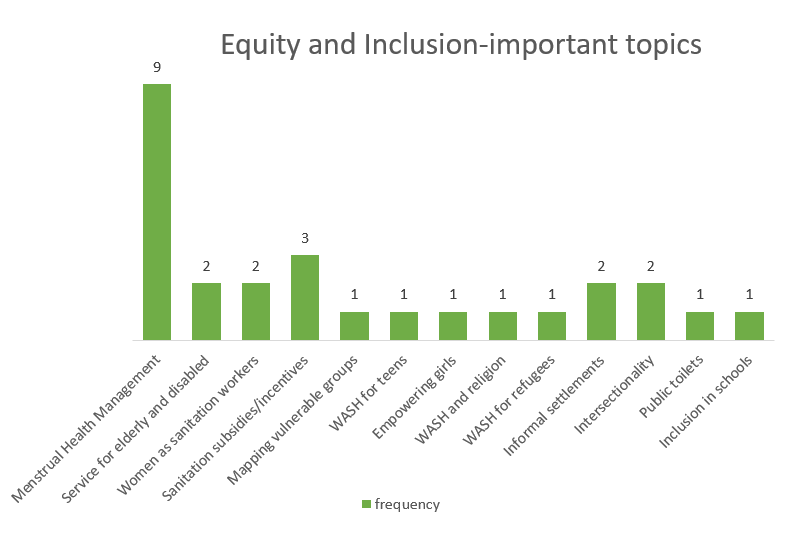 Suggested_...3-13.png
(Filesize: 29KB)
Suggested_...3-13.png
(Filesize: 29KB)
Please Log in to join the conversation.
You need to login to reply- secretariat
-
 Topic Author
Topic Author- Moderator
- SuSanA secretariat currently allocates 2 full time person equivalents of time from members of GIZ Sustainable Sanitation Team: Arne Panesar, Alexandra Dubois, Maren Heuvels, Teresa Häberlein, Daphne Manolakos and Bettina-Sophie Heinz.
Re: SuSanA provides space for discussions around Equity & Inclusion – which topics are important?
From the 29th SuSanA meeting that was held in Kampala, Uganda on the 22nd February, attendees got a chance to give their input on this exciting topic. The question they responded to was what topics they would like to see under new section "Equity and Inclusion".
27 persons responded via phone evaluation by giving one answer and there was no prioritizing. The results obtained via digital voting on mentimeter will follow. Exciting!
It is evident that the one topic that most attendees suggested needs even more attention is Menstrual Health Management (MHM).
Regards,
Keitumetse
Located at Deutsche Gesellschaft für Internationale Zusammenarbeit (GIZ) GmbH, Bonn, Germany
Follow us on facebook: www.facebook.com/susana.org, linkedin: www.linkedin.com/company/sustainable-sanitation-alliance-susana.
Attachments:
-
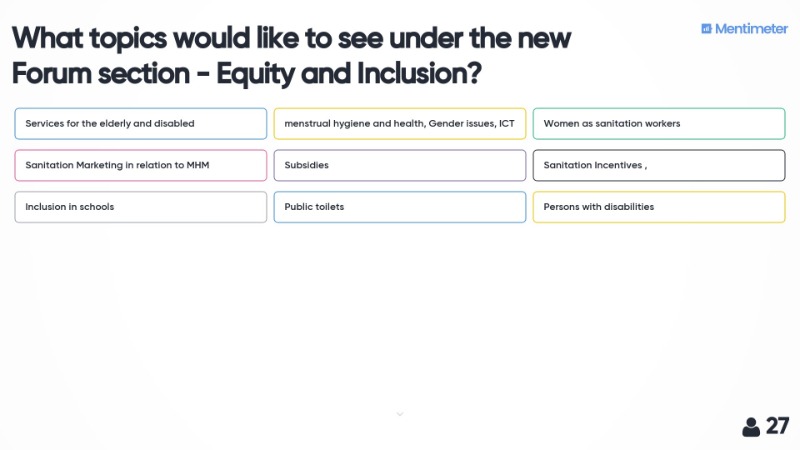 5-what-top...nd-1.jpg
(Filesize: 43KB)
5-what-top...nd-1.jpg
(Filesize: 43KB)
-
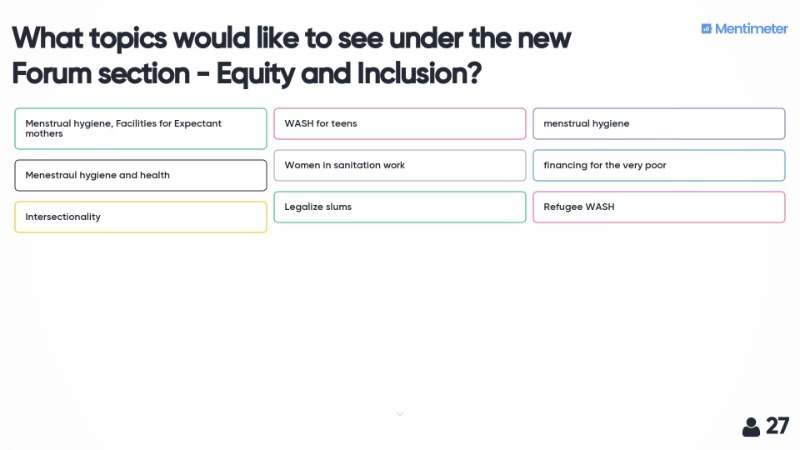 5-what-top...nd-2.jpg
(Filesize: 43KB)
5-what-top...nd-2.jpg
(Filesize: 43KB)
-
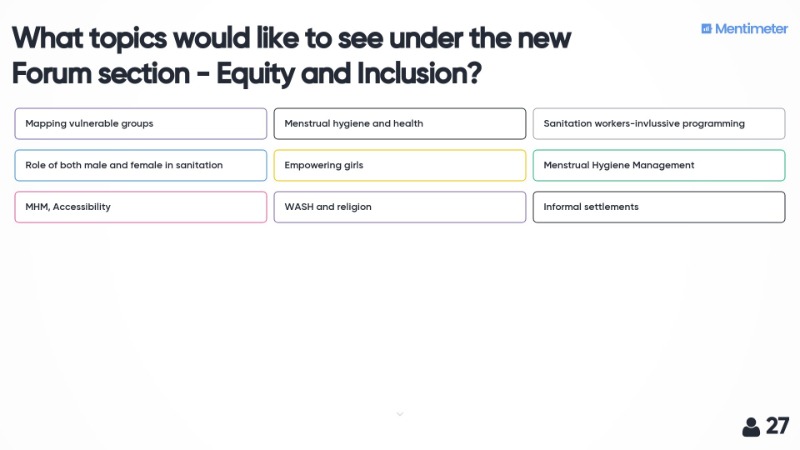 5-what-top...nd-3.jpg
(Filesize: 43KB)
5-what-top...nd-3.jpg
(Filesize: 43KB)
-
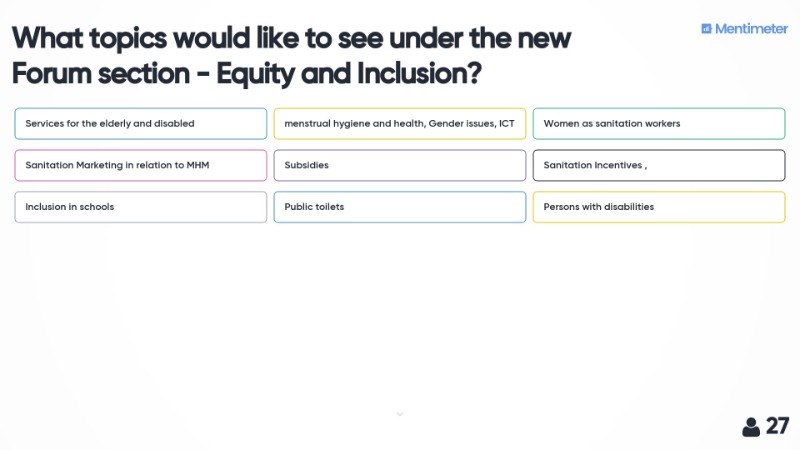 5-what-top...3-03.jpg
(Filesize: 43KB)
5-what-top...3-03.jpg
(Filesize: 43KB)
-
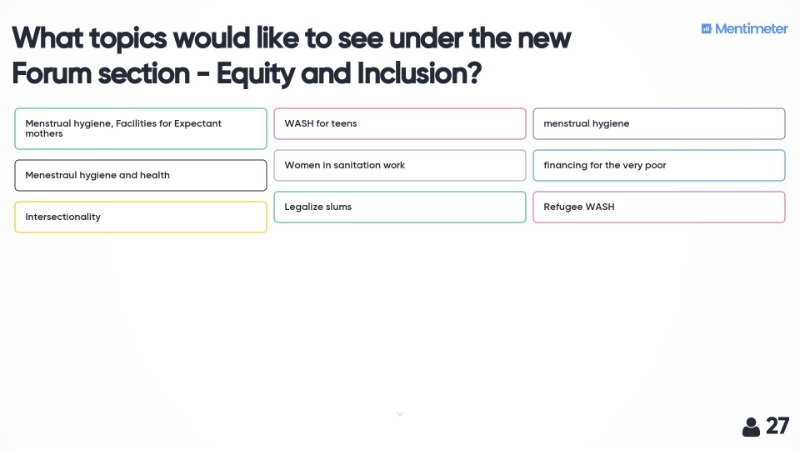 5-what-top...3-03.jpg
(Filesize: 43KB)
5-what-top...3-03.jpg
(Filesize: 43KB)
-
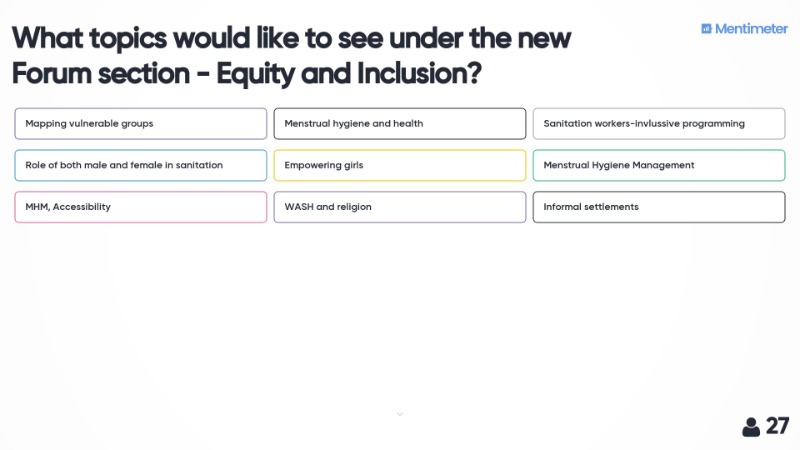 5-what-top...3-03.jpg
(Filesize: 43KB)
5-what-top...3-03.jpg
(Filesize: 43KB)
-
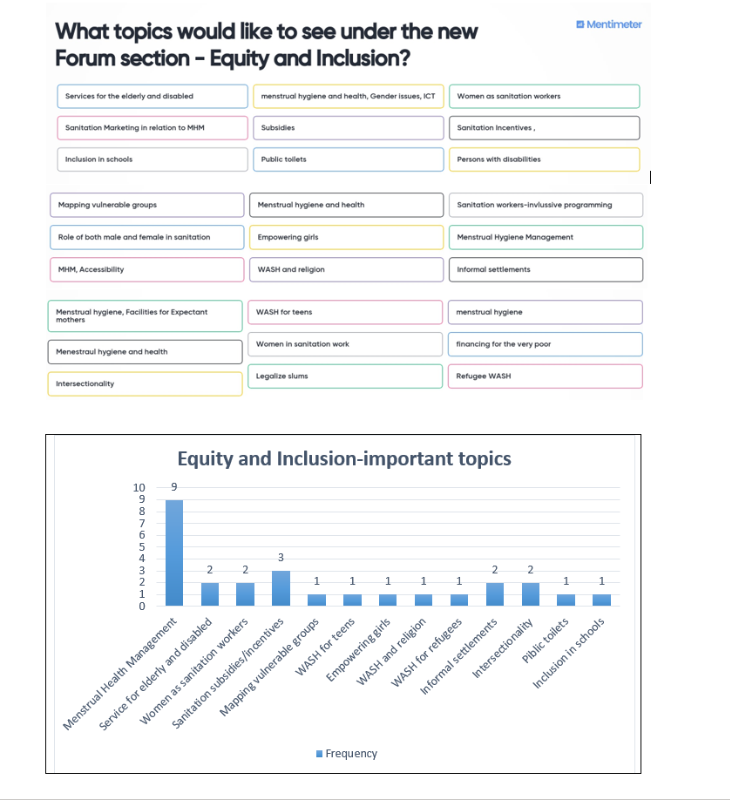 Topics-sug...ions.png
(Filesize: 185KB)
Topics-sug...ions.png
(Filesize: 185KB)
Please Log in to join the conversation.
You need to login to replyRe: SuSanA provides space for discussions around Equity & Inclusion – which topics are important?
WSSCC is very excited to join hands with SUSANA to facilitate discussions around Equity and Inclusion and provide a platform for sharing, learning and reflections on how the various issues that fall under this category affect our program designs, implementation, outputs and impacts.
The 8th category formed will be referred to as Equity and Inclusion, so far 5 sub-categories have been identified as key contributors to issues relating to equity and inclusion in various contexts as follows:
1. Gender
2. MHM
3. Persons living with disabilities
4. Health & Sanitation workers
5. Inclusive programming
The setting up of this 8th category does not mean that these listed issues will not be discussed under the other categories, but we hope that this creates a platform where these issues are discussed in detail in their own right as well as strategies on mainstreaming or integrating them. This category will provide a space whereby we can learn and share what has worked out or failed so far, before thinking of how best integration would happen and the foreseen challenges of integration.
So, far we have agreed on having the icon representing the 8th category in a yellow background, but we feel that it would be great to have various members contribute towards the icon itself. We are hoping for an interesting brainstorm on the type of icon that we could use for this 8th category that would capture the essence of equity and inclusion.
We look forward to a vibrant and exciting discourse.
Best regards;
Elizabeth Wamera
Technical Expert: Water Sanitation & Hygiene (WASH) Technical Support Unit
Water Supply & Sanitation Collaborative Council (WSSCC)
Please Log in to join the conversation.
You need to login to reply- Elisabeth
-
- User is blocked
- Freelance consultant since 2012
Less- Posts: 3372
- Karma: 54
- Likes received: 932
Re: SuSanA provides space for discussions around Equity & Inclusion – which topics are important?
I am going to try and summarise what has been said so far (mainly by Franzi, Alice, Brian and Katherine) and will offer a way forward. The consensus seems to be that ideally we should have both: a dedicated space or sub-category on equity and inclusion but also mainstream it into the existing threads and discussions where it fits.
It would be dangerous to only focus on a "new space" because then people might say "that one is irrelevant for me" and won't read it and won't learn even though it would actually be relevant for them but they don't know it yet. E.g. construction of pit latrines - how can they be built so that a big range of people can easily use them, also those with disabilities.
The Kunena forum software that we are using here does not support the use of keywords or tags.* Although of course one can use the search function to search for certain keywords. We also wouldn't support posting the same post into two different places, e.g. posting the same content in the equity & inclusion category and also into the sub-category on pit emptying.
* Later in the year we are upgrading to the latest version of Kunena, perhaps it will include the functionality of tags.
With regards to topics inside of the category equity & inclusion, the following were mentioned:
- Sanitation workers (this is currently included in the sub-category on pit emptying: forum.susana.org/99-faecal-sludge-transp...its-and-septic-tanks)
- Disability (currently part of the red category "health, hygiene & schools" with its own sub-category: forum.susana.org/93-inclusion-and-disability)
- Gender (currently included in the orange category in the sub-category on community-led approaches but not very obvious: forum.susana.org/5-community-led-approac...otal-sanitation-clts)
- Gender-based violence (GBV) - same as for gender
- MHM (currently part of the red category with its own sub-category: forum.susana.org/24-menstrual-hygiene-management-mhm)
- Perimonopause (would be included in the existing MHM category)
- WASH in schools (currently part of the red category with its own sub-category: forum.susana.org/27-schools-sanitation-and-hygiene-in-schools)
- LGBT+ (we haven't had many posts on this yet; note we never create empty sub-categories but wait for the threads to arrive first)
- Incontinence (currently part of the red category without its own sub-category)
- Baby WASH (is included in the category on WASH and nutrition: forum.susana.org/248-babywash)
So all these topics already have spaces on the forum (except perhaps LGBT+) but it may not be immediately obvious. I would hesitate to add an 8th category at the top level because I am mindful of some feedback in the past which was "you have so many categories, I am confused where to put my topic".
My suggestion would be to change the title of one of the top-level categories to include the words "equity" and then create a sub-category inside of that main category. The natural place would be either the red one or the orange one. The red one is already quite big and quite focused on health. I am tempted to rather take the orange category (behaviour & attitudes).
We could change the orange category to "Behaviour, attitudes & equity". Then inside there we could set up several sub-categories, and we could move sub-categories from the red category to the orange one.
So the plan of action could be like this:
- Orange category renamed to behaviour, attitudes & equity.
- Existing sub-category on MHM moved into the orange category (includes perimenopause).
- Existing sub-category on inclusion moved into the orange category.
- Create new sub-category (or sub-categories) on gender and GBV and LGBT+ (and move existing threads into there).
- Create new sub-category on sanitation workers (and move existing threads into there).
- Incontinence to stay in the health category - no own sub-category needed unless many threads are posted on the topic
What do you all think?
Regards,
Elisabeth
Freelance consultant on environmental and climate projects
Please Log in to join the conversation.
You need to login to reply- walelegn
-
Less
- Posts: 1
- Likes received: 0
Re: SuSanA provides space for discussions around Equity & Inclusion – which topics are important?
Please Log in to join the conversation.
You need to login to reply- Alice
-
 Less
Less- Posts: 32
- Karma: 1
- Likes received: 12
Re: SuSanA provides space for discussions around Equity & Inclusion – which topics are important?
thank you for the initiative to open the discussion around equity and inclusion.
Regarding the question whether to open an 8th main category or whether equity and inclusion should be discussed as sub-categories within other topics, I want to suggest the idea of a Twin-Track approach.
I have read about this approach in UNICEF documents on disability cross-cutting other sectors such as nutrition (see example document attached): "The need for a twin-track approach, which includes both disability mainstreaming and setting up special services, where needed to reach children with disabilities and their families or caretakers."
Bottom line: why debate either this or that, let's do both: mainstream equity and inclusion as sub-categories and provide a specific space for the topic in itself, because in my view it is needed. The reasons are severalfold and can all be found in the UN flagship report which I can't attach because it is too big, which states also "Data and statistics compiled and analysed in the present report indicate that persons with disabilities are not yet sufficiently included in the implementation, monitoring and evaluation of the SDGs."
Do you have any working group leaders or forum leaders (don't know the correct terms, sorry) that live with a disability? "Don't do anything about us without us", I highly recommend this to be taken into consideration when discussing equity and inclusion.
Best regards
Alice
Advisor
Sanitation for Millions
Department Climate, Environment and Infrastructure
Deutsche Gesellschaft für
Internationale Zusammenarbeit (GIZ) GmbH
65726 Eschborn
Germany
T +49 6196 79 -2437
E This email address is being protected from spambots. You need JavaScript enabled to view it.
Please Log in to join the conversation.
You need to login to reply- Elisabeth
-
- User is blocked
- Freelance consultant since 2012
Less- Posts: 3372
- Karma: 54
- Likes received: 932
Re: SuSanA provides space for discussions around Equity & Inclusion – which topics are important?
Carl, I didn't really get your point? Maybe there is some confusion over what is meant with "equity" and "inclusion" in this context. With regards to definitions, my go-to place is Wikipedia. Here there is a page on "social equity" which is probably useful: en.wikipedia.org/wiki/Social_equity
With regards to inclusion, we are referring to this one, I think: Inclusion (disability rights)
en.wikipedia.org/wiki/Inclusion_(disability_rights)
Both pages seem a bit short and perhaps incomplete. We could put it on our to-do list to improve them and to add WASH-related references where they fit.
Regards,
Elisabeth
Freelance consultant on environmental and climate projects
Please Log in to join the conversation.
You need to login to replyRe: SuSanA provides space for discussions around Equity & Inclusion – which topics are important?
Equity is very difficult to define some are happy with less some will always want more … same with inclusion, some wants to be included others are introverts and want to be left alone. As with all value discussions, you can’t define what is best what beauty is kindness is BUT ALMOST everyone HAS A PREFERENCE FOR SOME KIND OF KINDNESS OVER CRUELTY. This I feel is the basis for all value discussions … we are pretty clear over what preference we have for feeling ! Trump and Pelosi would never agree what wealth is but they would easily agree what the preference is regarding wealth over adjunct poverty. This is where we need to start when we want to define morality … what is right and wrong, what is good and bad.
All the best intentions
Carl
Please Log in to join the conversation.
You need to login to reply- BrianReed
-

- A trainer in WASH with over 20 years experience of capacity building globally.
Less- Posts: 6
- Likes received: 2
Re: SuSanA provides space for discussions around Equity & Inclusion – which topics are important?
This is an on-going debate (well at least 20 years old) and there is not an easy answer. If you want to have impact, then E&I should be mainstreamed - included in every topic as appropriate. Meeting the needs of women or people with disabilities should not be seen as a specialist subject but as core to providing standard sanitation services. Portioning these issues off can make them appear “extra” rather than normal practice.
However, this can make certain issues less prominent as it is drowned out in the general debate. Specific needs do not get championed and those with the weakest voice get lost. Thus the need for specific attention being given. At least E&I is getting more inclusive - years ago every subsection would have separate debates (women, elderly etc.) and lose the common elements that benefit all.
One approach I used a few years ago when timetabling the WEDC conference was to mainstream “gender” (which was the only E&I topic at the time), by putting papers on “gender and sanitation” in with the sanitation theme and “women and water” under water supply. This meant everybody was exposed to the messages rather than just an interested core. However, I knew there were participants who were very interested in gender, so I flagged relevant papers in the timetable (with a “G” I think) so they could switch between sessions and follow a different path. In the final plenary session there was a specific report from this perspective to pull learning together.
Reviewing the current seven threads, you can see how they have evolved over time. Knowledgepoint uses “tags” so you can tag your post with several keywords rather than taking a linear path. If you were to revise the threads, shouldn’t you stand back and see if there are other patterns that could be used? Where is emergency sanitation? Where are other forms of environmental sanitation? The technical topics (systems and reuse) have responded to interest at the time, but they are not incompatible.
Xxxxxxxxxxxxxxx
On a different point “what topics are important?” Can again be seen through an historical lens. It was women, then gender, mainly related to water supply, then disability became a topic, followed by MHM, GBV and now LGBT+ and incontinence. BabyWASH seems slower to gather momentum but the perimenopause has had some work done.
For more about this see “Mainstreaming gender in the WASH sector: dilution or distillation?” www.tandfonline.com/doi/full/10.1080/13552074.2017.1331541
You cannot really identify in advance what topics will become important, mainly because by their very nature these issues have not been talked about in the past. There are some areas that do seem neglected - such as some disabilities (people using a wheelchair are more obvious than a blind or deaf person and their physical requirements are more obvious for example).
As I said at the beginning, there is no easy answer - but at least I hope this perspective has opened up some more questions!
BSc (Hons)(Dunelm), PGDip (Lond), MSc (N’cle), CEng, CEnv, C.WEM, MICE, MCIWEM, FHEA
Please Log in to join the conversation.
You need to login to reply- KatherineP
-
Less
- Posts: 1
- Likes received: 0
Re: SuSanA provides space for discussions around Equity & Inclusion – which topics are important?
Thanks for initiating this discussion.
There are existing materials on the topics of inclusion and equity (disability, gender, MHM) for the school setting which can provide valuable learning for other settings.
Public schools are open to all and provide a unique basis for the topic of equity. Schools provide a levelling opportunity for children to benefit equally from interventions regardless of their background. Children which are missed by WASH interventions at community or household level will still benefit in the school setting.
Schools also contribute to establishing norms and can provide a neutral space to address taboos. As values of inclusion are established in schools, these norms can then spillover into communities.
It would be great to link this topic to the existing sub-category on inclusion and disability within the health, hygiene and schools category. Or alternatively, it would be great to have a sub-category on WASH in Schools within this larger inclusion category.
Best regards,
Kathy
Please Log in to join the conversation.
You need to login to reply- Elisabeth
-
- User is blocked
- Freelance consultant since 2012
Less- Posts: 3372
- Karma: 54
- Likes received: 932
Re: Reply: SuSanA provides space for discussions around Equity & Inclusion – which topics are important?
- The blue one ("sanitation systems"), and
- The green one ("resource recovery")
I hesitate to propose a whole new category that would be called Equity and Inclusion. Rather I would probably include it into one of the existing categories and possibly rename that one.
I wonder if it would fit inside of the orange ("attitudes and behaviours") or the grey category ("markets, finance and governance") - with or without changing the name of the particular category.
In terms of existing sub-categories we have some where these topics are already discussed (and which could possibly be moved to a different category) such as:
- Inclusion and disability (in the red category)
- Other non-household settings (e.g. hospitals, health centres, prisons, train stations, offices, work places) (also in the red category)
- Advocacy and civil society engagement (in the orange category)
Here is another consideration: Let's say we want to discuss more about social inclusion in financing schemes (e.g. do subsidies go more towards the middle class segment of society than the poor), then shouldn't we do that in our existing sub-category on financing (like we have it here with the discussion by SNV: forum.susana.org/164-financing-taxes-tar...te-to-greater-equity - "SNV egroup discussion Topic 2: Can public funding (taxes and transfers) in sanitation contribute to greater equity?") or is it wiser to do it within a new "Equity category" which would then have a sub-category on finance & inclusion/equity?
The same applies to gender aspects: Should gender-related topics be discussed inside all of the existing sub-categories or have their own sub-category (and then inside that sub-category repeat the various thematic areas like awareness raising, advocay, capacity building etc.).
I am almost thinking: if it's an overarching theme then it does not need its own category but needs to be well integrated into all the others, somehow?
Regards,
Elisabeth
Freelance consultant on environmental and climate projects
Please Log in to join the conversation.
You need to login to reply- FranziskaVolk
-

- I am striving for a world where we are linked, and not ranked.
Less- Posts: 48
- Karma: 2
- Likes received: 16
Re: Reply: SuSanA provides space for discussions around Equity & Inclusion – which topics are important?
I like the idea that the new section could make the “Human side of sanitation” more prominent (the technical sanitation systems category is really packed with over 1,800 topics, whereas non-technical aspects are available, but are much fewer discussed).
One topic that we already do see in this space, and where a number of activities happen right now, is the topic of sanitation workers.
On Thursday, 21 November, Sida, SEI, SLU, WaterAid, SIWI, Univ of KwaZulu Natal, Water for People and SuSanA held a Webinar on Sanitation and Employment. Sanitation workers provide an essential public service, but all too often it comes at the cost of their health, safety and dignity. Among others, the newly launched report on the “Health, Safety, and Dignity of Sanitation Workers” was presented, and can be found in the SuSanA library and on the WASH Matter Blog.
Last year on WTD, SuSanA launched the photoessays on sanitation work in urban India “ Where there are no sewers ”. The next volume is currently being developed in Lusaka, Zambia with photographs by Lior Sperandeo .
The preface of the publication by Susanne Dorasil, German Federal Ministry for Economic Development and Cooperation (BMZ), reads:
Millions of sanitation workers who clean sewers, open drains, septic tanks, community and school toilets, railway cleaners, as well as pit emptiers, and the severe conditions they face, need our specific attention. Often, sanitation workers are poorly paid, lack safety training, and do not wear protective gear. As a result, workers are demanding a better work environment. While sanitation along the whole service chain is a precondition for dignity for all, there is also a gender dimension in this topic that needs special attention.
In addition, SuSanA, jointly with BORDA, GIZ and FSMA are organizing “ Pit Emptying Skills challenges " with the aim to inspire professionals to demonstrate their skills and show the limitations and requirements of their daily work life to sector stakeholders. The challenges started at FSM4 and FSM5, a regional challenge took place at ZAWAFE Zambia, and the next one is planned for 20th AfWA Congress in February 2020 in Kampala, Uganda
On the occasion of WTD 2019, UN-Water also opened a photo exhibition on “Sanitation workers: light at the end of the tunnel” www.worldtoiletday.info/sanitation-workers/
Best regards,
Franziska
Global Water Operators’ Partnerships Alliance (GWOPA) at UN-Habitat- visit at gwopa.org/ and follow @gwopa
Please Log in to join the conversation.
You need to login to reply- Equity, inclusion and sanitation workers
- Inclusive programming and other topics under equity and inclusion
- SuSanA provides space for discussions around Equity & Inclusion – which topics are important?







